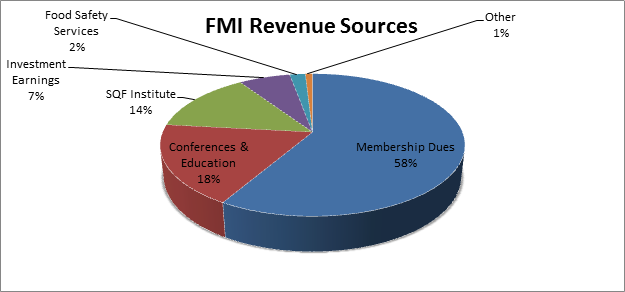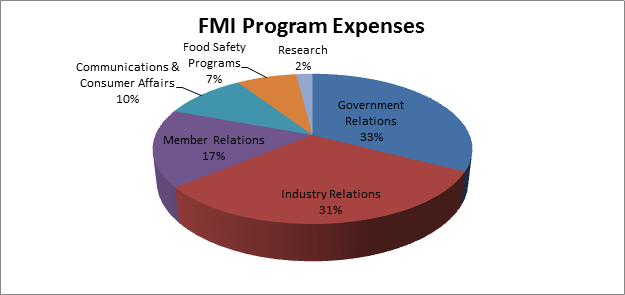By: Sam DiCarlo, Chief Financial Officer & Senior Vice President, Administration, Food Marketing Institute

The infinitely complex game of baseball can actually be reduced to three simple components; hit the ball, throw the ball and catch the ball. Likewise, finance can be very complicated, but it too can be reduced to the answer to three simple questions: Where does our income come from? What is the money spent on? What does the subsequent bottom line look like?
Let’s look first at FMI’s income question for 2017. Providing the food retail industry with the myriad services and products requires human and financial resources. Funding those resources requires resources, and like all well run business endeavors, FMI seeks to diversify its revenue streams.
The graph below illustrates that while membership dues provide the majority of funding for FMI, 40 percent of its revenue is derived elsewhere. Conferences and education, fees from Safe Quality Food Institute (SQFI) services and investment earnings make up the majority of FMI’s non-dues revenue.

Next, let’s turn our attention to FMI program expenses and the graph below shows how FMI distributed and administered its funds in service of the food retail industry. A third of FMI’s program expenditures are government relations oriented and last year were utilized in advocating on behalf of food retailers regarding the national legislative and regulatory issues that were of priority concern and interest to the industry. A little less than a third of FMI’s budget is engaged in our industry relations initiatives, programs and resource development. The remaining third supports FMI’s work in member relations, communications and consumer affairs, food safety and research.

That brings us to the all-important bottom-line question and here we have good news. After paying for all the services, programs and products in 2017, FMI will run a surplus. Although FMI is considered a “Not-for-Profit” entity, it is important that we employ sound business practices, such as avoiding prolonged periods of operating deficits. 2017 will be the 8th consecutive year FMI finishes with an operating surplus. In a time when the food retail industry is facing unprecedented change, including numerous business consolidations, it is wise to remain on sound financial footing. FMI's accumulated surplus will serve as a secure funding source as FMI prepares to address the emerging industry needs that the future will no doubt bring.
 Industry Topics address your specific area of expertise with resources, reports, events and more.
Industry Topics address your specific area of expertise with resources, reports, events and more.
 Our Research covers consumer behavior and retail operation benchmarks so you can make informed business decisions.
Our Research covers consumer behavior and retail operation benchmarks so you can make informed business decisions.
 Events and Education including online and in-person help you advance your food retail career.
Events and Education including online and in-person help you advance your food retail career.
 Food Safety training, resources and guidance that help you create a company food safety culture.
Food Safety training, resources and guidance that help you create a company food safety culture.
 Government Affairs work — federal and state — on the latest food industry policy, regulatory and legislative issues.
Government Affairs work — federal and state — on the latest food industry policy, regulatory and legislative issues.
 Get Involved. From industry awards to newsletters and committees, these resources help you take advantage of your membership.
Get Involved. From industry awards to newsletters and committees, these resources help you take advantage of your membership.
 Best practices, guidance documents, infographics, signage and more for the food industry on the COVID-19 pandemic.
Best practices, guidance documents, infographics, signage and more for the food industry on the COVID-19 pandemic.
